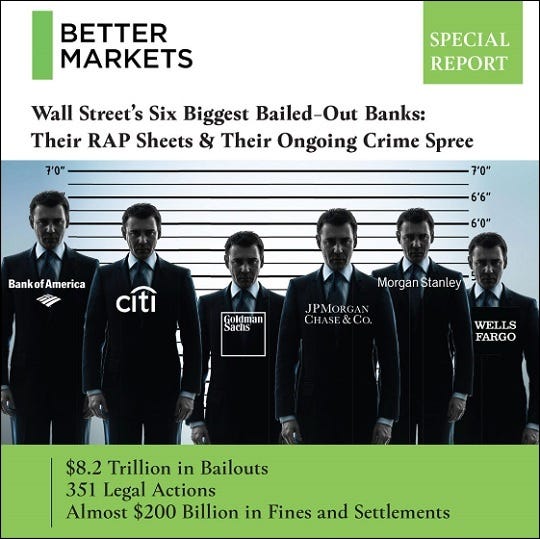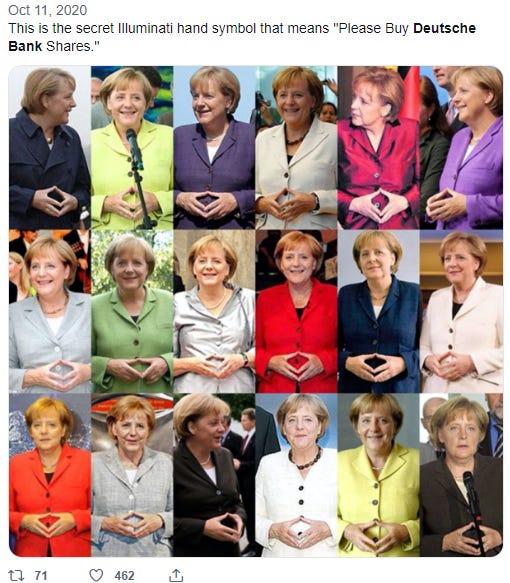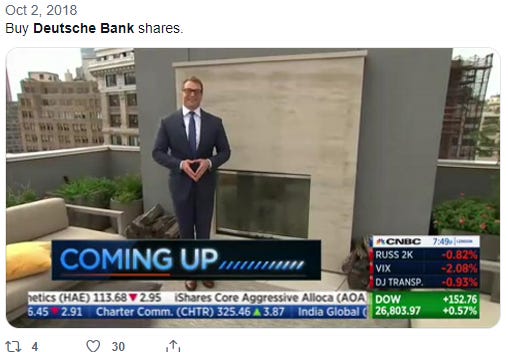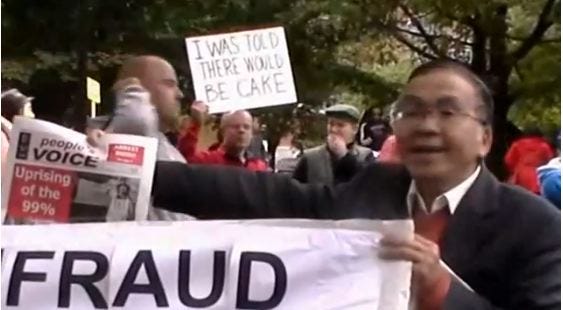Thanks to those posting links to my Substack posts - and statements of support - on Twitter. A lot of people there seem to be unaware of this Substack.
Deutsche Bank “poses as the largest bank in Germany, but it’s actually the largest criminal enterprise in Germany, which is something, because it has to compete with Volkswagen.” - William K. Black, 2018
You may remember I had a post on March 15 titled, Credit Suisse is Fine.
Deutsche Bank’s illegal conduct involved nearly a decade of lying, cheating, and stealing. This criminal conduct was pervasive and widespread, involving dozens of employees from Deutsche Bank offices including New York, Frankfurt, Tokyo, and London. Deutsche Bank’s traders engaged in a brazen scheme to defraud Deutsche Bank’s counterparties and the worldwide financial marketplace by secretly manipulating LIBOR. The conduct is appalling. It was a complete criminal fraud upon the worldwide marketplace.
Kara M. Stein, Dissenting Statement in the Matter of Deutsche Bank, May 4, 2015
“The Racketeer Influenced and Corrupt Organizations (RICO) Act is a United States federal law that provides for extended criminal penalties and a civil cause of action for acts performed as part of an ongoing criminal organization.”
“He that is without sin among you, let him first cast a stone at Deutsche Bank.”
- Brian Moynihan
BREAKING

“Deutsche Bank is a classic [case of] ‘control fraud,’” said William K. Black, associate professor of economics and law at the University of Missouri-Kansas City. He explained that “control fraud” occurs when “a seemingly legitimate entity and the people that control it use it as a weapon to defraud others and commit other predation and crimes.” A former white-collar criminologist, Black had referred to the concept in his 2005 book The Best Way to Rob a Bank is To Own One: How Corporate Executives and Politicians Looted the S&L Industry. “[Deutsche Bank] poses as the largest bank in Germany, but it’s actually the largest criminal enterprise in Germany, which is something, because it has to compete with Volkswagen,” he added, referring to the German automaker’s 2015 emissions scandal…
“The problem is it is perceived as a national champion,” said Black. “The greater problem is that it’s a national champion that loses every joust, and it’s revealed to have cheated every time it gets into a joust. … So it’s a pathetic and embarrassing national champion in that regard.”
…Black said that Deutsche Bank has failed to fulfill promises made to regulators each time it was fined for lapses over the last 12 years. “Deutsche Bank has used up all of its second, third, fourth, fifth and six chances.”
…According to Black, Gresham’s Law is at work in the Deutsche Bank case – a monetary principle that bad money drives out good. “Deutsche Bank either needs to be under completely new management, where you have to rip out the entire top leadership, or it needs to be merged [with another bank],” he said.
Some of the world’s biggest banks — including Wells Fargo and Deutsche Bank — as well as other lenders have engaged in a systematic fraud that allowed them to award borrowers bigger loans than were supported by their true financials, according to a previously unreported whistleblower complaint submitted to the Securities and Exchange Commission last year. (2020)
The first investor in Ron Insana’s hedge fund was Deutsche Bank! (2008)
Janet Yellen’s benefactors include Credit Suisse and Deutsche Bank
A few random stories from my notes over the years…
How the United States Became a PR Disaster for Deutsche Bank (2010)
Deutsche Bank CEO Ackermann Slammed - 'One of the Most Dangerous Bankers in the World' (2011)
German regulator’s scathing report on Deutsche Bank made public (2015)
Germany’s Deutsche Bank, Again in Trouble, Received a U.S. Bailout Twice as Big as Lehman Brothers (2016)
Deutsche Bank Doubles Down on Leveraged Loans in Growth Push (2017)
Deutsche Bank and Citigroup Bleed More Equity Yesterday: The Reason Should Concern Us All (2018)
Bill Black: Deutsche Bank Crimes Could Trigger Next Global Crisis (2018)
The Repo Loan Crisis, Dead Bankers, and Deutsche Bank: Timeline of Events (2019)
Deutsche Bank’s Running Tab of Investigations (2019); “The Cost of Bad Behavior”
Donald Trump & Deutsche Bank's Complicated Relationship (2020)
Deutsche Bank still mulling how to help Wirecard: Bank’s CEO says aid is ‘almost an obligation’ (2020)
Deutsche Bank: Suspected of facilitating funds to Daesh in Iraq
Deutsche Bank broke its own rules in enabling tax fraud, probe finds (2022)
Deutsche Bank Settles Jeffrey Epstein Vetting Lawsuit for $26 Million (2022)
JPMorgan, Deutsche Bank Sued by Epstein Accusers in New York (2022)
So much smoke around Deutsche Bank - someone should write a book. Oh, wait!
There is no proof that Hermann Abs knew exactly what was going on inside the death camp his bank was financing. He wasn’t a member of the Nazi Party. But it is inconceivable that he was completely in the dark…
After Germany surrendered in 1945…Hermann Abs had fled Berlin in the back of a delivery truck on the eve of the Allied invasion, and he was now wanted as a war criminal. When he was later tried in absentia and sentenced to a decade of hard labor, the British came to his aid; Abs ended up working the fields at an upscale prison camp for a few months and then was released…
By 1956, they published an annual report under the umbrella name Deutsche Bank Group. Soon after that, the ten banks were legally reunited, operating out of a three-story stone building in Frankfurt. The name Deutsche Bank was hung from the top of the building in large bold lettering. The bank’s directors unanimously elected Abs—the convicted war criminal—to be their leader.
In another excellent book, Tower of Basel: The Shadowy History of the Secret Bank that Runs the World, Adam LeBor writes:
The members of the Committee for Foreign Economic Affairs included Hermann Abs of Deutsche Bank, the most powerful commercial banker in the Third Reich. The dapper, elegant Abs was an old friend of the BIS. He had been sent there by Schacht during the 1930s to try and stall demands for repayments of the loans that financed Germany after 1918. In Basel, Abs frequently met with a British banker called Charles Gunston, who was a protégé of Montagu Norman. Gunston managed the Bank of England’s German desk, which made him immensely important during the 1930s. Gunston was so keen on the new Germany that he spent his 1934 summer holidays at a work camp for enthusiastic Nazi party members. He also admired Abs and later described him as “Very urbane. Always a velvet glove around an iron fist.” Abs did not join the Nazi party, but he was so essential for the functioning of the Third Reich’s economy that he did not need to. As the head of Deutsche Bank’s foreign department during the war, Abs was the lynchpin of the continent-wide plunder, directing the absorption of Aryanized banks and companies across the Third Reich. During the twelve years of the Third Reich, the bank’s wealth quadrupled.
Some interesting Deutsche Bank research in 2016 (no link)
It surprised him that Deutsche Bank didn't seem to care which bonds he picked to bet against. From their point of view, so far as he could tell, all subprime mortgage bonds were the same.
On May 19, 2005--a month before the terms were finalized--Mike Burry did his first subprime mortgage deals. He bought $60 million in credit default swaps from Deutsche Bank--$10 million each on six different bonds. "The reference securities," these were called. You didn't buy insurance on the entire subprime mortgage bond market but on a particular bond, and Burry had devoted himself to finding exactly the right ones to bet against. He'd read dozens of prospectuses and scoured hundreds more, looking for the dodgiest pools of mortgages, and was still pretty certain even then (and dead certain later) that he was the only human being on earth who read them, apart from the lawyers who drafted them. In doing so, he likely also became the only investor to do the sort of old-fashioned bank credit analysis on the home loans that should have been done before they were made. He was the opposite of an old-fashioned banker, however. He was looking not for the best loans to make but the worst loans--so that he could bet against them.
He analyzed the relative importance of the loan-to-value ratios of the home loans, of second liens on the homes, of the location of the homes, of the absence of loan documentation and proof of income of the borrower, and a dozen or so other factors to determine the likelihood that a home loan made in America circa 2005 would go bad. Then he went looking for the bonds backed by the worst of the loans. It surprised him that Deutsche Bank didn't seem to care which bonds he picked to bet against. From their point of view, so far as he could tell, all subprime mortgage bonds were the same.
Michael Lewis, The Big Short
The entire pools of loans that Deutsche Bank securitized and to a large degree originated in the transactions are plagued by rampant fraud and misrepresentations and an abdication of sound origination and underwriting practices - Assured Guarantee lawsuit
Deutsche Bank knowingly and intentionally securitized loans originated based on unsupported and fraudulent appraisals. Deutsche Bank knew that mortgage originators were “‘giving’ appraisers the value they want[ed]” and expecting the resulting appraisals to meet the originators’ desired value, regardless of the actual value of the property. Deutsche Bank concealed its knowledge of pervasive and consistent appraisal fraud, instead representing to investors home valuation metrics based on appraisals it knew to be fraudulent. Deutsche Bank misrepresented to investors the value of the properties securing the loans securitized in its RMBS and concealed from investors that it knew that the value of the properties securing the loans was far below the value reflected by the originator’s appraisal.
Nobody saw it coming: FBI warns of mortgage fraud 'epidemic' (2004)
Rampant fraud in the mortgage industry has increased so sharply that the FBI warned Friday of an "epidemic" of financial crimes which, if not curtailed, could become "the next S&L crisis."
I saved this after seeing it on a mortgage brokers forum in 2007:
Evergreen:
The whole system weakens itself
because it gets caught in this big lie
that says we have to pretend
that Deutsche Bank is a bank
instead of a criminal enterprise.
Bill Black
Your problem is that you are trying to understand this as an economic story.
Once you look at it as a crime story, you'll get it.
Matt Taibbi

























I'll say one thing for you, you know how to do your homework!
"Finally, the misallocation of capital caused by ECB policy is preventing creative destruction and causing asset bubbles."
This is at the heart of virtually every economic problem globally and if you follow the money you'll find it also has a hand in 99% of the global social ills. Capitalism works if the government plays it's role of referee and the central banks enforce lending standards, both of which are in steep decline after going off the gold standard and have little relevance to whatever economic system is actually in place today.